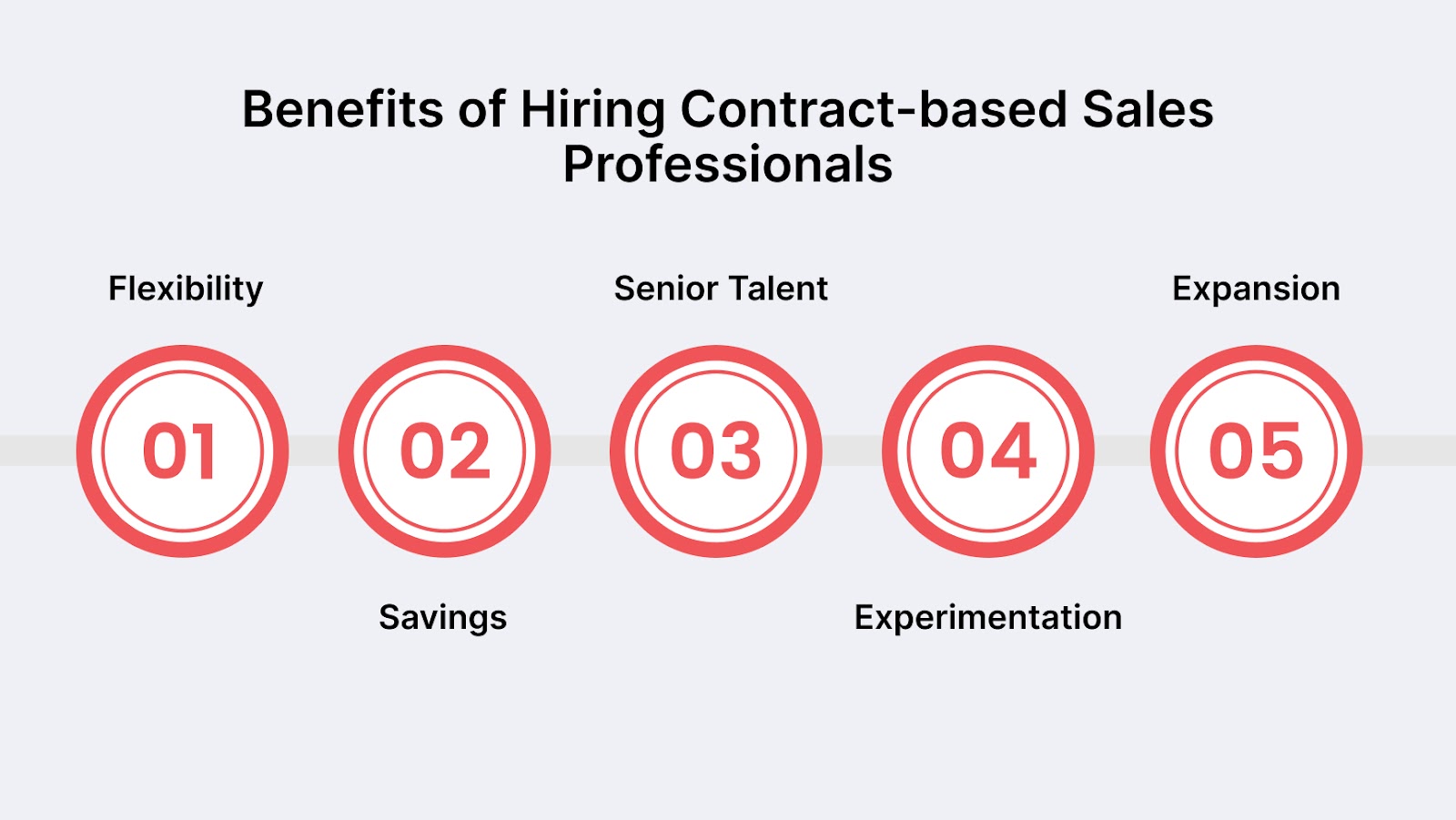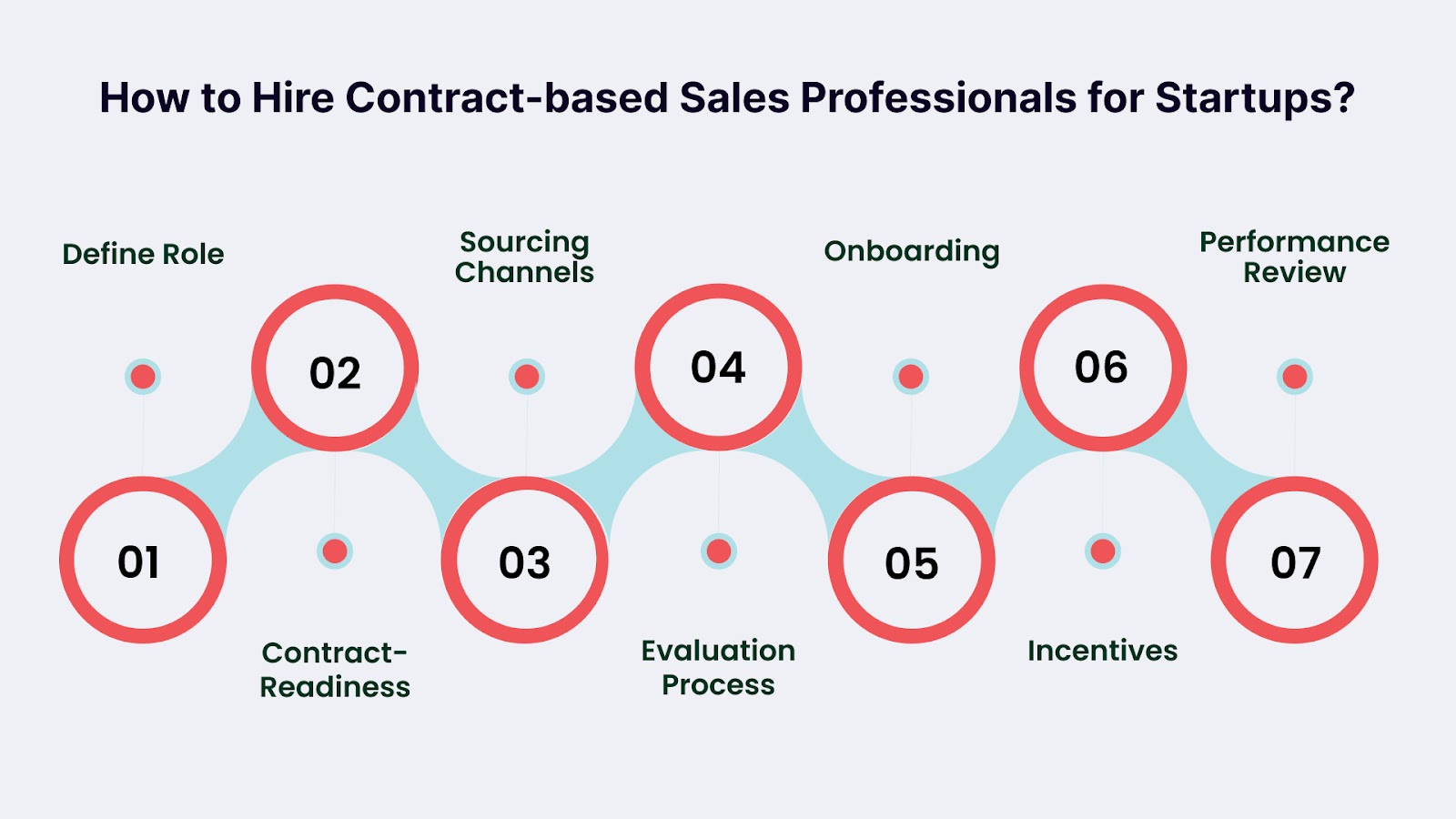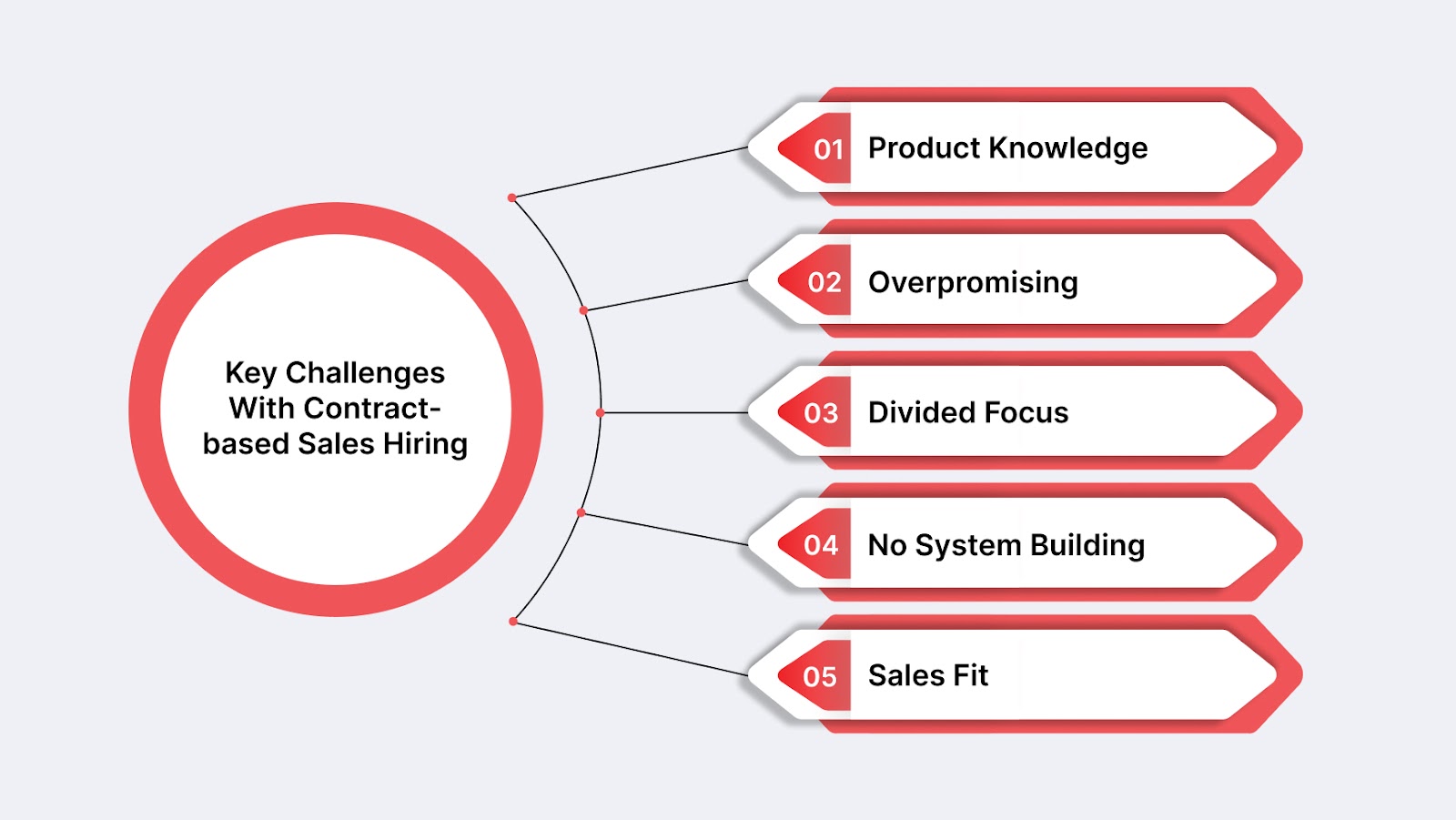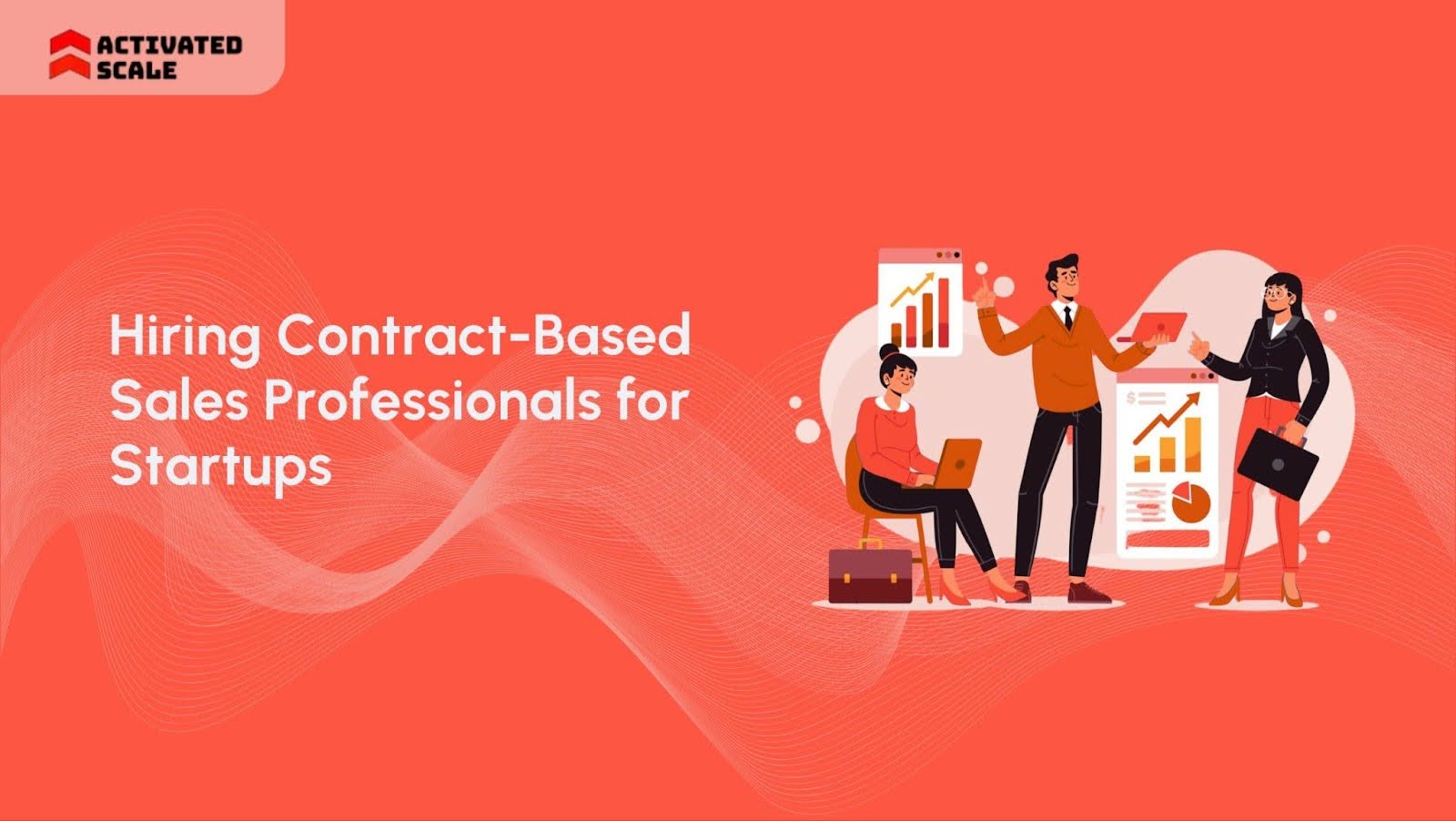Startup founders often hit a wall after validating their product. Scaling sales with the right talent becomes a real challenge. In fact, 45% of employers struggle to find qualified candidates due to cost and flexibility.
We’ve worked with early-stage teams that tried hiring fast and ended up wasting quarters retraining or rehiring. So, we understand well that hiring the wrong person in sales sets growth back by months.
In this blog, you’ll learn how contract-based sales professionals for startups solve this problem. We’ll walk through their benefits, how to hire them smartly, what to avoid, and the models that scale.
In a Nutshell:
- Contract-based sales reps give you flexibility to execute fast without the risk or cost of full-time hires.
- You need clarity on ICP, sales motion, and deal size before sourcing freelance or contract talent.
- Running short-term pilots is the best way to test for ownership, fast ramp-up, and measurable outcomes.
- Fractional hires like SDRs, AEs, or even VPs of Sales can support outbound, GTM planning, and playbook design.
What are Contract-based Sales Professionals?
Startups often struggle to grow revenue while keeping overhead low. Hiring full-time salespeople early can feel risky, especially without predictable cash flow or product-market fit. That’s where contract-based sales professionals offer a practical advantage.
Contract-based sales professionals for startups include sales development representatives (SDRs), account executives (AEs), and even fractional sales leaders. Instead of betting on a single hire, you get targeted help where you need it most.
But how exactly does your business benefit from hiring these professionals? We’ll discuss that in the next section.
Also Read: Why Startups Are Embracing Fractional Sales Talent
Benefits of Hiring Contract-based Sales Professionals

Startups need to move fast but without overspending or locking into long-term hires too early. Here’s how flexible sales hiring helps startups:
- Operational flexibility: Scale sales efforts up or down based on traction, performance, or funding without long-term commitments.
- Cost savings: Avoid overhead expenses like benefits, office space, and equipment. Many reps work on performance-based compensation.
- Access to senior talent: Work with experienced reps and leaders who've scaled startups before, without paying full-time salaries.
- Faster experimentation: Test new ideal customer profiles (ICPs), outbound scripts, or channels quickly without waiting to hire or onboard a full team.
- Easy market expansion: Enter new segments or regions with minimal internal disruption. Contract reps make territory testing smoother.
You’ve seen how contract-based sales professionals work with accountability. The next step? Finding and hiring the right ones without wasting time or budget.
How to Hire Contract-based Sales Professionals for Startups?

Hiring contract-based sales professionals isn’t like hiring full-time AEs. You need reps who can hit the ground running, work without daily supervision, and align with your go-to-market (GTM) stage. Here’s a seven-step guide you can follow:
1. Define the Type of Sales Role You Need
Before hiring, identify the exact function you're trying to strengthen. Are you:
- Building a top-of-funnel sales pipeline?
- Validating outbound channels or messaging?
- Expanding into a new segment or region?
- Needing short-term AE support to close deals?
Match contract roles to specific sales stages:
- SDRs: Lead sourcing, cold outreach, appointment-setting
- AEs: Deal ownership, pipeline management, closing
- Full-cycle reps: Ideal for early-stage startups with no layered sales org
Also consider complexity. A transactional sales cycle needs different skills than a consultative, multi-touch one.
Tip: Write a 1-page role brief covering ideal customer profile (ICP), tools used, key performance indicators (KPIs), and expectations.
2. Identify Signals of Contract Readiness
Not every sales rep performs well on a contract basis. Prioritize candidates with:
- Experience in freelance or fractional sales roles
- Outcome-driven track records (e.g., “booked 40 SQLs in 6 weeks”)
- Familiarity with customer relationship management (CRM) and outbound tools (HubSpot, Outreach, etc.)
- Ability to ramp independently with minimal support
During interviews, ask:
- “What did your first 30 days look like at your last contract role?”
- “How do you plan and execute outreach campaigns?”
- “What metrics do you hold yourself accountable to?”
Strong answers here are a better indicator than brand-name logos on resumes.
3. Use Targeted Sourcing Channels
Generic job boards aren’t effective for contract sales hiring. Instead, use platforms and communities that surface specialized sales talent:
- LinkedIn: Use keywords like “contract SDR” or “freelance AE”
- RevGenius, RevOps Co-op: High-signal communities for GTM talent
- Referrals: Ask other startup founders, GTM advisors, or investors
- Platform: If you're scaling quickly, consider tapping into Activated Scale’s pre-vetted network of contract reps to skip early screening:
- Contract-to-Hire Sales Recruiting: You can start with a flexible model where you engage vetted reps on a trial basis. This gives you time to assess fit across pipeline quality and culture, without making an upfront hiring commitment.
- Fractional Selling: If your need is short-term or channel-specific, it lets you work with experienced SDRs and AEs who are already fluent in outbound tools. These professionals are outcome-driven and fast to ramp, ideal for startups that can’t wait 90 days to fill the top of the funnel.
- Fractional Sales Leadership: For early-stage founders, this service gives you access to seasoned VPs who can set up reporting cadences.
To have the best sales rep in your team, start hiring sales talent from Activated Scale.
4. Run a Focused Evaluation Process
Speed matters, but don’t skip signal collection. Use a 2-step process:
Step 1: Tactical interview
Assess process ownership and clarity. Ask:
- “What were your KPIs in the last role?”
- “How did you structure a week of outbound prospecting?”
- “Can you walk me through a deal you moved from cold to close?”
Step 2: Paid trial
Structure a short (1–2 week) pilot with defined goals:
- Write custom cold emails
- Run outbound campaigns to a defined list
- Book 3–5 meetings with your ICP
Observe how they ramp, handle tools, and report progress. Prioritize reps who need minimal onboarding to deliver early outcomes.
5. Provide Clear Onboarding and Context
Contract-based reps ramp faster when you eliminate ambiguity. Here’s what you can do:
- Interview your ICPs and share the briefs with your hired team
- Product positioning and value props
- CRM workflows, list sources, and outreach playbooks
- Email and call templates with proven messaging
- Examples of successful outreach or past campaigns
Set expectations in week one:
- Target accounts per week
- Outreach volume and quality benchmarks
- Pipeline contribution goals (e.g., 5 SQLs in 2 weeks)
6. Create Alignment through Performance-linked Incentives
High-performing contractors prioritize clients who reward outcomes. Build compensation models around contribution, not just hours.
Options include:
- Fixed base + milestone bonus
- Per-meeting rate with minimum call quality or ICP-fit threshold
- Closed-deal commission for full-cycle reps (aligned with AEs or founder-led closers)
Also, define the scope clearly. For example, who owns which part of the pipeline and service level agreements (SLAs) for follow-ups or lead handoffs.
7. Review Performance and Scale With What Works
Use weekly performance reviews to evaluate fit. Track:
- Outsource cold call/email per day
- Response rates and meeting booked
- Lead quality and stage progression
- CRM hygiene and handoff process
If a rep consistently meets targets, consider:
- Extending their contract
- Increasing scope (e.g., new vertical or region)
- Looping them into strategic feedback on ICPs or messaging
If they’re underperforming, close out fast and revisit your sourcing or onboarding assumptions.
Hiring contract-based sales professionals seems like a fast win, but it comes with trade-offs. If you skip due diligence or ignore early signs, the risks compound. Knowing these friction points helps you plan smarter.
Also Read: How can you build a sales process at your startup?
Key Challenges With Contract-based Sales Hiring

Even the best contract-based hires can fall short if the context isn’t right. Many challenges stem from mismatched expectations or overlooked process gaps. That’s why knowing what to watch for upfront matters as much as finding the right rep.
Here’s a list of issues you can face:
- Shallow product understanding: Contractors won’t always invest time to grasp technical depth or product nuances. It happens if your pitch has multiple use cases or buyer personas.
- Overpromising from freelancer platforms: Top profiles on marketplaces may look polished but lack execution skills. Without context, you're betting on self-reported success.
- Split focus across clients: Most contractors juggle multiple gigs. You might not get the responsiveness or mental bandwidth your startup’s GTM motion really needs.
- No incentive to co-build systems: Contract reps rarely build sales infrastructure. If your CRM, email templates, or outreach logic need work, they won’t fix it.
- Misfit with founder-led sales style: Startups often need reps who adapt to scrappy, evolving sales motions. Many contractors prefer structured processes, which you might not have yet.
Avoid costly mismatches by working with Activated Scale. We connect you with vetted contract-based sales talent who’ve already delivered results in early-stage startups. Book a call to find your fit faster.
Conclusion
You don’t need a full-time hire, but what you really need is executional bandwidth. Reps who can plug into your system and start generating pipelines today.
Contract-based sales professionals for startups offer impact without long-term risk. Done right, this isn’t a stopgap. It’s a smart way to test new segments, refine your pitch, and build repeatable systems before you scale your team full-time.
Looking to shortcut the hiring curve? Get in touch with us to get matched with proven contract-based sales talent in days, not months.
FAQs
1. Who is a contract-based sales professional?
A contract-based sales professional works on a freelance or short-term basis. They help companies to generate leads, run outreach, or close deals, without being a full-time employee.
2.When should a startup hire contract-based sales reps?
Early-stage startups often hire contract reps to test new ICPs or cover sales gaps before building a full in-house team.
3. How do contract-based reps differ from full-time hires?
Contract reps bring specialized skills for a fixed scope or outcome. They usually require less ramp time but may not handle long-term relationship management unless hired full-time.
4. What should be included in a contract agreement?
Key elements include scope of work, confidentiality clauses, IP ownership, and clear exit criteria to avoid misalignment.
5. Where can I find trusted contract-based sales talent?
You can use platforms like LinkedIn or specialized networks like Activated Scale. In this way, you can access pre-vetted contract sales professionals, including SDRs, AEs, and fractional leaders.
The Ultimate Guide to Hiring a Salesperson!
Get the step-by-step guide to hiring, onboarding, and ensuring success!
_edi.png)




